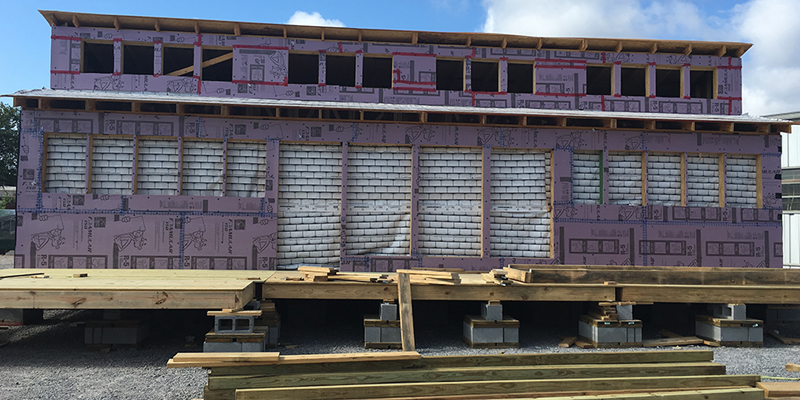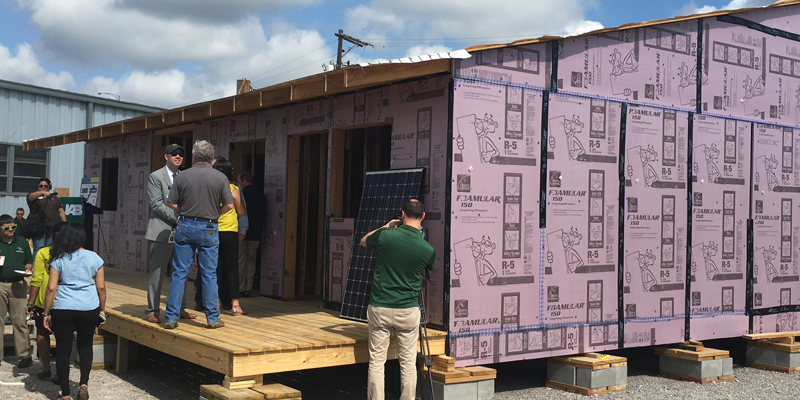


Code Council attends surviv(AL) house unveiling at University of Alabama at Birmingham Solar Decathlon |
SHARE    |
 |
| Front view of the SURVIV(AL) House constructed by the University of Alabama at Birmingham's Team Alabama competing in the U.S. Department of Energy's Solar Decathlon 2017. |
| The University of Alabama at Birmingham (UAB), in partnership with Calhoun Community College, is one of 16 collegiate teams from around the world selected to participate in the U.S. Department of Energy's Solar Decathlon 2017 — a collegiate competition made up of 10 contests that challenge student teams to design and build full-size, solar-powered houses. The winner of the competition is the team that best blends design excellence and smart energy production with innovation, market potential, and energy and water efficiency.
The UAB's Team Alabama is committed to being a part of the next generation of problem solvers, and to advancing sustainable smart solutions for the future. More than 60 students — representing graduate and undergraduate students studying health sciences, English, engineering, marketing, anthropology, theater arts, biology and more — share the singular goal of competing and winning the Solar Decathlon. Many team members look toward future careers in the renewable energy sector despite wide-ranging backgrounds, interests and academic disciplines. Team Alabama's SURVIV(AL) House is classically Southern in design. Before the development of air conditioning, residents had to build their homes to deal with hot, humid weather. The use of cross ventilation, a heavily insulated envelope, precise protection of glazing, shaded porches and transparent canopies, and site orientation (the position of a building in relation to an east-west axis) are taken into consideration in the generation of the building form. Additionally, Team Alabama Decathletes devised a remarkable system for beating the Alabama heat and reducing energy costs — the UAB-developed device uses a liquid desiccant system in combination with a solar collector to take water out of the air. This system dehumidifies the air inside the home at night, and recharges the material during the day, reducing the overall load on the home's air-conditioning system. The SURVIV(AL) House will serve as a model for sustainable, resilient housing for severe, weather-prone communities. Since Alabama has been struck by more tornadoes than any other U.S. state since 1966 — with eight of those tornadoes classified as EF5 — the house incorporates a safe room with tornado panels to protect its inhabitants, designed by engineers at UAB's Materials Processing & Applications Development Center. The safe room is designed in accordance with FEMA standards to withstand 250 mile-per-hour winds, and will remain intact even if the house is destroyed during a strong storm. In the event of a natural disaster, the house offers "quick permanence," a term used to describe a home that can be quickly rebuilt and assembled to provide independence in the aftermath of a disaster. The house is prototyped so that any contractor can rebuild quickly and easily. International Code Council Architectural & Engineering Services Technical Staff Jason Toves and Architectural & Engineering Services Senior Staff Engineer Jeff Walker, both engineering graduates of the University of Alabama at Birmingham who work in ICC's Eastern Regional Office in Birmingham, attended the unveiling of the SURVIV(AL) House. "Overall, the event was very interesting," said Toves. "As a UAB graduate myself, I was very impressed with the support of the university towards it students and their endeavors. The UAB Office of Sustainability was very involved, and there were many students participating from many different disciplines such as engineering, marketing and businesss." The group mentoring Team Alabama students represent an unconventional collaboration between UAB's Facilities Administration and Management programs (including its Sustainability office) and the academic engineering and business departments on campus. The students also worked closely with the experienced plumbers, electricians and carpenters on campus, as well as sponsoring architects and building professionals in the region, to learn real-world construction skills. A copy of the 2015 International Residential Code and ICC 500—2014 ICC/NSSA Standard for the Design and Construction of Storm Shelters were given to the Team Alabama students by Walker and Toves. The International Code Council is proud to support the University of Alabama at Birmingham's Team Alabama in their efforts on this project. |
 |
| Diagonal view of the SURVIV(AL) House constructed by the University of Alabama at Birmingham's Team Alabama competing in the U.S. Department of Energy's Solar Decathlon 2017. |